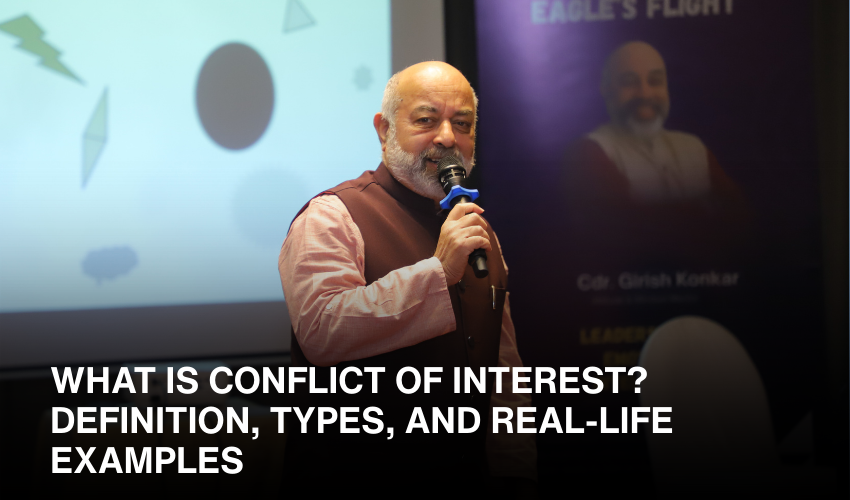
As professionals, leaders, and decision-makers, we are often faced with choices that
test not only our skills but also our integrity. Many ask, “What is conflict of
interest?” Simply put, it is a situation where personal interests could improperly
influence, or appear to influence, our judgment, decisions, or actions. Understanding
this concept is critical for building trust, credibility, and ethical leadership.
In this article, I will unpack what conflict of interest truly means, explore different
types, highlight real-life anecdotes, and explain how visionary leaders can manage such
situations with
self-motivation
and clarity.
What is Conflict Interest in Simple Terms?
The phrase “what is conflict interest” is often misunderstood as outright dishonesty. In reality, it doesn’t always involve intentional wrongdoing. It arises when:
- Your personal interest clashes with your professional responsibility.
- Your financial, family, or social ties affect objective decision-making.
- Even the perception of bias could damage credibility.
For example, if a manager awards a contract to a company owned by a cousin, that’s a potential conflict, even if the cousin’s company is the best option. What matters is not only the action but also how it appears to others.
Conflict of Interest in Ethics: Why It Matters
When we talk about conflict of interest in ethics, the conversation goes beyond rules and
regulations. Ethics is about doing the right thing, even when nobody is watching.
Conflicts compromise fairness and accountability. In ethical leadership, transparency is
non-negotiable. By disclosing possible conflicts early and recusing oneself when necessary,
a leader demonstrates integrity. A visionary leader understands that credibility takes years
to build and seconds to lose.\
I once worked with a senior executive who was offered a board position at a vendor company.
It was prestigious, financially rewarding, and tempting. But he chose to decline because
accepting it could raise questions about his impartiality. That choice, guided by ethics,
strengthened his reputation as a trusted leader.
Conflict of Interest Example: Stories We Can Learn From
Understanding theory is important, but examples help us recognize conflicts in action. Let’s
look at a conflict of interest example from everyday life.
Imagine a university professor supervising research grants. If her spouse owns a company
that supplies lab equipment, awarding the contract to that company,without
disclosure,creates a conflict. Even if the products are high quality, the lack of
transparency damages trust.
Another conflict of interest example is in hiring. A project leader might push for a family
member to be hired, believing they are competent. But colleagues may see favoritism, which
undermines team morale.
Years ago, I mentored a young manager who was proud of hiring his childhood friend. He
insisted it was based on merit. But within weeks, the team’s trust eroded. The lesson? In
leadership, perception is as important as reality.
Conflict of Interest in the Workplace
Organizations are fertile grounds for conflicts because decisions affect money, promotions, and opportunities. Understanding conflict of interest in the workplace is vital for both employees and leaders.
Some common workplace scenarios include:
- Procurement bias: Favoring vendors you have personal ties with.
- Nepotism: Giving preferential treatment to relatives or friends.
- Insider trading: Using confidential company information for personal gain.
- Outside employment: Taking a second job that competes with or undermines your employer.
Managing conflict of interest in the workplace requires clear policies, disclosure mechanisms, and training. Leaders must create a culture where employees feel safe to declare potential conflicts without fear of retaliation.
Types of Conflict of Interest You Must Know
When people ask, “What is conflict of interest?” they often assume it is one single category. In reality, conflicts can take many forms:
- Financial Conflicts – Personal financial gain affects decisions.
- Family Conflicts – Relatives or close friends benefit from decisions.
- Competing Commitments – Time and loyalty divided between two organizations.
- Gifts and Hospitality – Accepting benefits that may influence objectivity.
- Self-Dealing – Using official position for personal advantage.
Each type carries its own risks, but all share one consequence: they erode trust.
How Visionary Leaders Handle Conflicts
A visionary leader does not avoid difficult situations,they face them with clarity. The best leaders rely on self-motivation to act ethically even when temptations arise. Here’s how they manage conflicts:
- Disclosure: Be open about potential conflicts. Transparency is strength, not weakness.
- Recusal: Step aside from decisions where personal interests may cloud judgment.
- Policies: Establish and enforce clear organizational guidelines.
- Culture: Encourage employees to speak up when they see conflicts.
Leadership is not about being perfect, it’s about being accountable.
Why Asking “What is Conflict Interest” Matters Today
In an interconnected world where reputations are built in minutes and destroyed in seconds,
the question “what is conflict interest” is more relevant than ever. Whether it is corporate
governance, politics, education, or healthcare, conflicts can appear anywhere.
When leaders understand the nuances of conflict of interest in ethics and actively prevent
conflicts of interest in the workplace, they don’t just follow rules,they inspire trust. And
in leadership, trust is the ultimate currency.
Final Thoughts
We began with the question: What is conflict interest? The answer is not just a definition
but a call to action. Every leader, professional, and employee must recognize that conflicts
are inevitable, but mismanaging them is not.
By learning from every conflict of interest example, upholding the principles of ethics, and
addressing conflicts openly in the workplace, we build cultures where trust thrives.
Remember: true leadership is tested not when choices are easy, but when personal interests
compete with professional duty. The leaders who pass this test leave behind legacies of
integrity.
About Coach Girish Konkar
Cdr. Girish Konkar (Retd.) is a former Indian Navy Submarine Commander turned Leadership & Transformation Coach with over 40 years of experience across military and corporate arenas. As CEO of Beyond Horizons, he blends experiential tools like NLP, Psych-K®, etc. with strategic insight to empower authentic, resilient leaders. He now dedicates his journey to guiding professionals and organizations toward purposeful leadership, growth, and lasting impact.





